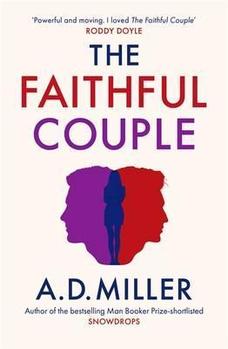
Initially, The Faithful Couple seems a radical departure from AD Miller’s first novel, Snowdrops, about corruption in modern Russia, which was short-listed for the 2011 Man Booker prize. Marketed as the story of male friendship (although, from first glance at the title, I had it logged as a gay romance) and its limitations (p101):
The Faithful Couple also appears, at first, the weaker of the two. While Snowdrops moves through exotic locations at the pace of a thriller, the author’s second novel, despite its longer timescale, meanders slowly through the more charted territory of turn of the millennium capitalism. Neither Neil, nor Adam, are particularly likeable, or even interesting (although they do seem real and, like many long acquaintances, do tend to grow on you), and an early incident in the Yosemite National Park, where Neil has sex with a fifteen-year-old girl, does little to arouse the reader’s sympathy.
And yet. One of the remarkable aspects of AD Miller’s debut, is the way in which the reader is made to feel complicit in the narrator’s deepening immorality. It took me about 100 pages to realise it, but The Faithful Couple achieves something similar; an even greater accomplishment, when the subject matter is closer to home.
Although it is Neil who has committed the crime, Adam is also culpable, both in encouraging the flirtation (p102):
He acknowledged the hypnotic momentum of the holiday, for most of which the two of them had scarcely noticed women, being too preoccupied with each other, until finally they had turned their energy outwards, looking for a mediator and a prize, and found her. Found Rose.
and, more chillingly, unlike Neil, in knowing she’s underage. His failure to intervene comes back to haunt him when he himself becomes a father, just as Rose’s father had threatened it would. The incident is present in each subsequent interaction between the two men, variously avoided, played down, or offered up as a guilty confession of betrayal, but it can never go away. The repetition – or perhaps our reaction to it – evokes uncomfortable feelings in the reader: who wants to admit that, when such a violation has occurred, they wished the characters would just forget about it and move on?
The novel also touches on other aspects of power and corruption: Adam’s upper-class upbringing that has inadequately prepared him to confront moral dilemmas (p115):
They were all or nothing people, Adam realised, his family, his breed. Their only game plan was to get all the way through, right to the end, thinking as little as possible, in the hope that they could outrun it – whatever it was that they were frantically eschewing, the neglect or abuse or adultery. The failure, or the guilt. If it outran you, if it caught you, you were fucked
Neil’s playing of the property market and Adam’s disassociation from the policies and procedures of the immigration department that employs him (p116):
he took solace in the fact that these were never his policies. His job was merely to orchestrate the process as humanely and efficiently as possible, from the immigration tribunals to the detention centres to the planes. Better him than some hang-′em-and-flog-′em hatchet man
The Faithful Couple is a challenging but worthwhile read about compromised morality, a theme that’s cropped up from time to time in the discussions of my reviews (e.g. regarding whistleblowers; the unfair distribution of resources; the limitations of compassion) and on other blogs, especially Norah Colvin’s. It’s also about how meanings, and loyalties, change over time and circumstances. Thanks to Little, Brown for my review copy.





















 RSS Feed
RSS Feed





















